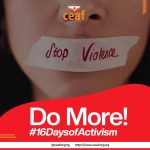On this Day 10 of the #16DaysOfActivism Against Gender-Based Violence, the Comfort Empowerment and Advocacy Foundation (CEAF) reaffirms its commitment to the fight against violence directed at women and girls. Violence against women (VAW) is not just a personal tragedy—it is a societal crisis that undermines human rights, equality, and development. Eliminating this violence requires the concerted effort of everyone in society, from individuals to institutions.
This year, we call on everyone to actively challenge violence against women in their homes, communities, workplaces, and online spaces. Together, we can create a culture of accountability, respect, and zero tolerance for gender-based violence.
Understanding Violence Against Women
Violence Against Women (VAW) encompasses a range of harmful behaviors rooted in power imbalances, gender inequality, and cultural norms. It includes:
Physical Violence: Beatings, physical assault, or injuries inflicted by partners, family members, or others.
Sexual Violence: Rape, sexual harassment, or coercion, often leaving survivors with lasting trauma.
Emotional and Psychological Abuse: Manipulation, intimidation, and humiliation that erodes self-esteem and mental health.
Economic Abuse: Denial of financial independence, employment opportunities, or access to resources.
Cultural Practices: Harmful traditions like female genital mutilation (FGM), child marriage, and widow inheritance.
These forms of violence have far-reaching consequences, affecting not just the survivors but also families, communities, and nations.
The Reality in Nigeria
In Nigeria, violence against women remains pervasive despite laws and policies aimed at prevention. The National Demographic and Health Survey (NDHS) reports that nearly 30% of Nigerian women aged 15-49 have experienced physical violence. The true numbers may be higher due to underreporting, driven by stigma and fear of reprisal.
Key factors contributing to VAW in Nigeria include:
Patriarchal norms that reinforce male dominance and control.
Economic dependency, which limits women’s ability to escape abusive relationships.
Weak enforcement of laws, leaving many perpetrators unpunished.
Cultural silence, where survivors are blamed or pressured to stay silent.
Why Eliminating VAW Requires Collective Action
No single entity can address VAW alone. It requires the involvement of individuals, communities, governments, and organizations like CEAF to create a united front. Here’s why collective action is essential:
Challenging Cultural Norms
Harmful traditions and societal beliefs often normalize abuse and discrimination. By working together, we can reshape these norms to promote equality and respect.
Strengthening Laws and Policies
Advocacy from civil society and citizens can push governments to enact and enforce stronger laws against VAW. Collective voices carry more weight in demanding accountability.
Supporting Survivors
Survivors need a robust support system, including shelters, counseling, and legal aid. Community-driven initiatives can provide these resources and reduce the stigma survivors face.
Raising Awareness
Many people still lack understanding of what constitutes VAW and how to challenge it. Education campaigns can empower individuals to recognize and act against abuse.
CEAF’s Approach to Eliminating VAW
As a member of CEAF, our work is rooted in the belief that every woman deserves to live free from violence and fear. Our approach involves:
Community Education
CEAF organizes workshops, town halls, and school programs to educate people about VAW and gender equality. By addressing the root causes, we aim to prevent violence before it begins.
Survivor Support
We provide counseling, legal assistance, and safe spaces for survivors. Our upcoming safe house will be a sanctuary for women escaping abusive environments.
Advocacy for Policy Change
CEAF collaborates with policymakers to strengthen laws protecting women and ensure perpetrators are held accountable.
Engaging Men and Boys
Gender equality is not a women’s issue—it is everyone’s issue. CEAF actively involves men and boys in its programs, encouraging them to be allies in the fight against VAW.
Practical Ways to Challenge VAW
Everyone has a role to play in eliminating violence against women. Here are some practical actions individuals and communities can take:
Speak Out Against Abuse
Challenge harmful jokes, comments, or behaviors that perpetuate violence or sexism. Silence allows abuse to thrive.
Support Survivors
Listen without judgment and offer assistance to women who disclose abuse. Direct them to organizations like CEAF for further help.
Educate Yourself and Others
Learn about the dynamics of VAW and share your knowledge with friends, family, and colleagues. Awareness is the first step toward change.
Advocate for Change
Join campaigns, sign petitions, and support organizations working to end VAW. Collective advocacy can push for stronger laws and better enforcement.
Model Respectful Behavior
In your relationships, demonstrate respect, empathy, and equality. Teach young people about consent and healthy boundaries.
A Call to Action
On this Day 10 of the #16DaysOfActivism, CEAF calls on everyone to take action:
Challenge VAW in Your Environment
Look around your community. Are there women who need help? Are there harmful norms or practices that need addressing? Take a stand and make a difference.
Support the Work of CEAF
Volunteer your time, donate resources, or spread the word about our programs. Together, we can amplify our impact.
Advocate for a Safer Society
Push for systemic changes that address the root causes of VAW. This includes advocating for gender equality, economic empowerment, and access to justice for survivors.
Together, We Can End Violence Against Women
Eliminating violence against women is not just a moral obligation—it is a necessity for building a just and equitable society. Every action, no matter how small, contributes to the larger movement for change.
At CEAF, we believe in the power of collective action. When individuals, communities, and institutions come together, we can challenge and dismantle the structures that allow VAW to persist. Let today be a turning point—a day when you commit to being part of the solution.
Let us unite to challenge VAW and create a future where every woman can live free from fear and violence.


0 Comments